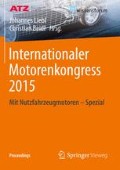Zusammenfassung
High power density, small installation dimensions, reliability and flexibility in the installation situation and in fuels will be important and proven criteria for industrial engines in the future. In this context, an overall package adapted to the device application and the customer will be an important success factor.
Low operation costs at high levels of performance require optimum fuel consumption. Through the use of highly sophisticated technology and – corresponding to the increasing requirements – extensive optimization of the complete system, it is possible to realize outstanding combustion efficiency and fuel consumption with the current engine generation. Thanks to continuous improvement of these technologies, a further reduction in fuel consumption in the low single-digit percentage range also appears to be possible in the future. However, if larger steps in consumption optimization were to be achieved, attention would have to be focused on new approaches for optimizing the entire powertrain. In this case, the individual systems of the vehicle or the application (transmissions, hydraulics, control and diesel engine) are considered holistically and analyzed for optimization potential.
Hybridization, in other words the combination of the combustion engine with a second electric power source in the drive train, provides considerable consumption potential. Whereas a range of hybrid systems are nowadays a feature of the product range in the automotive industry, there are only a few prototypes and small series solutions in the off-road application sector.
Hydraulic actuators and drives are often in use in industrial machinery, and these can be extended with a start-stop function with the integration of hydraulic energy storage. Socalled ″mild hybrid″ systems with enhanced functionality, such as substitution of hydraulic with electric drives, provide interesting improvement potentials. In this context within a project funded by the Federal Ministry for Economic Affairs and Energy (BMWi) DEUTZ AG manufactured a mobile material handler with a hybrid drive as a demonstrator. The project, which was named ″GRID – Green Industrial Diesel″, was carried out in cooperation with TEREX FUCHS over the last few years. The hybrid system for this material handler consists of a mild hybrid drive with a diesel engine from the TCD 6.1 series, which was equipped with an electric motor and the necessary power electronics. High-performance electrical components are, for example, the electric rotary actuator, the cooling fan for hydraulic oil or coolant in hydraulic excavators, and – in the case of a material handler – the electric magnetic plate for the handling of metal parts. In addition, the hybrid system is fitted with an electrical energy store.
In addition to the overall objective of rational and efficient energy use, the specific challenge of system optimization is to keep the usual operating behavior of the machine for the operator at least the same despite any major system changes. The goal is of course to significantly increase the performance through a new level of freedom for the system topology. Another important requirement is to size the hybrid system as compact as possible, because there is often only limited space in industrial applications.
Access this chapter
Tax calculation will be finalised at checkout
Purchases are for personal use only
Preview
Unable to display preview. Download preview PDF.
Author information
Authors and Affiliations
Editor information
Editors and Affiliations
Rights and permissions
Copyright information
© 2015 Springer Fachmedien Wiesbaden
About this paper
Cite this paper
Töpfer, G., Brun, M., Aschaber, M., Langthaler, P., Recheis, M., Schmid, J. (2015). Hybridisierung – Elektrifizierung von Motorenkomponenten. In: Liebl, J., Beidl, C. (eds) Internationaler Motorenkongress 2015. Proceedings. Springer Vieweg, Wiesbaden. https://doi.org/10.1007/978-3-658-08861-3_17
Download citation
DOI: https://doi.org/10.1007/978-3-658-08861-3_17
Published:
Publisher Name: Springer Vieweg, Wiesbaden
Print ISBN: 978-3-658-08860-6
Online ISBN: 978-3-658-08861-3
eBook Packages: Computer Science and Engineering (German Language)

